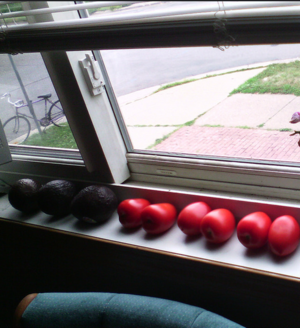
Fruit is often picked before it has fully ripened. This is necessary to allow for transportation, storage, longevity and sometimes even for the ripening process itself. There are varied methods for ripening fruits, depending on which fruit is being picked early. This article aims to cover a the fruit types that will ripen after harvest, explaining how to ripen the fruit.
Fruit does not die after it is harvested.[1] It continues to respire (breathing in oxygen and releasing carbon dioxide). Once detached from the plant source of nutrition, it has to rely on breaking down its stored food supplies. This is what alters the flavours and texture, as the starches, sugars and acids are used up.[1]
Be aware that not all fruit will ripen after harvesting, and even then, not all fruit will sweeten after it has been picked.
This is a work-in-progress.
Apples
Apples should be harvested when mature but not yet at full ripeness.[2]
Apricots
Place unripe apricots inside a paper bag. Add an apple. The ethylene from the apple will ripen the apricots quite quickly. Check regularly to avoid mushy apricots.
Avocados
These do not ripen on the tree. They must be removed from the tree (either by manual picking or by nature dropping it off) and then allowed to ripen.
This process can be helped along as follows: Place it in a paper bag. Put it in a warm place, such as a shelf higher up in the kitchen. Once ripe, the avocado should be stored in a cool place, such as the refrigerator.
Bananas
Bananas should not be allowed to ripen on the plant. If they do, they tend to split and their texture becomes floury and unappetising. By harvesting the bananas unripe, they are able to travel the long distances from tropical growing zones to cooler climates where bananas are in much demand but cannot be grown. Their sweetness and texture is best when ripened off the tree.
On the farm ripening: Remove the bunches of banana fruits from the plant. Tie the bunch with a length of rope, then hang the bunch up in the shade. Do not allow it to touch any other foliage, keep the area clear. At home ripening: Do not put them in the refrigerator! They will go black. If you have put them in there, the fruit is still fine, it just looks unappetising.
Bananas can be frozen to prevent them from continuing to ripen. They can be allowed to thaw or eaten as an ice lolly or frozen dessert.
Overripe bananas can be added to all sorts of baking, including cakes, biscuits (cookies), scones and muffins. They're also superb in a smoothie.
Mangoes
Under ripe mangoes are common in fruit retailers. This helps them to last longer and they ripen easily at home, once you know what to do.
To ripen: Wrap the mango in several layers of paper. This can be newspaper or any other spare paper that will cover the fruit. Place in a warm spot to ripen. If possible, put the mango on a higher shelf, to benefit from the hot air as it rises in the kitchen or other room. Check daily. You'll know it's ready when the smell of ripe mango wafts out from the paper upon opening.
Peaches
Peaches can be ripened inside a plastic carrier bag. Use the plastic bag to wrap around the peach or peaches. Add a ripe banana to the bag as well. Put aside for one day; the banana's ethylene will ripen the peaches.
Overripe peaches make superb peach cake or peach crumble and go well in peach or mixed fruit smoothies.
Pears
Pears are best ripened off the tree.[3] If left on the tree, most varieties of pears tend to become coarse and mealy.[3]To determine which varieties mature at which point in time, view https://catalog.extension.oregonstate.edu/fs147.
To ripen pears, remove them from the refrigerator or other cold storage place. Let sit at room temperature, with a reasonably high humidity. Allow to ripen fro three to four days.[3]They will be ready when turned a yellow colour. D'Anjou pears will retain some greenish tinge but will be ripe.[3]
Using fruit to ripen fruit[edit | edit source]
The ethylene gas given off by apples is useful for ripening fruits. It has the effect of being a nuisance too, if it is left near fruit that you didn't want ripened and you discover other fruit has become overripe.
Ethylene from apples can stop potatoes from sprouting, if the conditions are right. However, if the conditions aren't right, it can speed up the sprouting. The gist of this is, don't rely on apples from preventing sprouting unless you have tested which conditions produce this effect.
Fruits that won't ripen if picked unripe[edit | edit source]
Avoid picking any of the following fruits until they have actually ripened. If you purchase them unripe, return them to the seller.
- Grapes
- Lemons, limes and oranges
- Pineapples (although the skin will turn yellow, this is not the ripeness indicator––the sweet fragrance is the indicator of ripeness for this fruit)
- Strawberries, most berries
- Watermelons